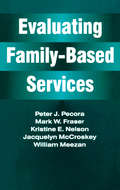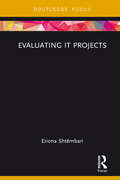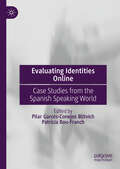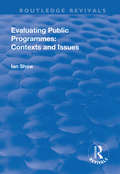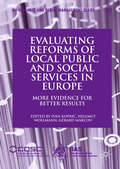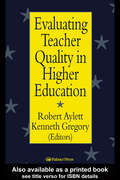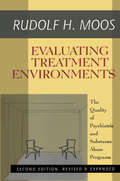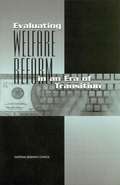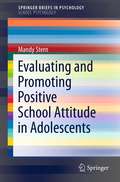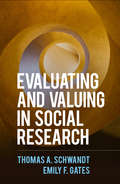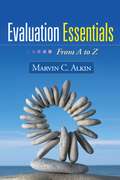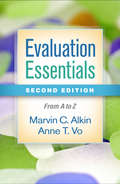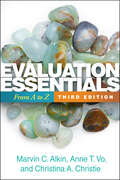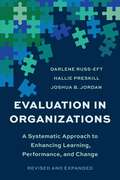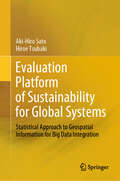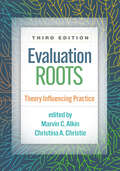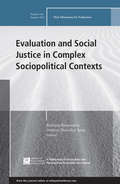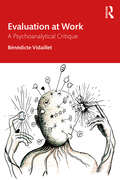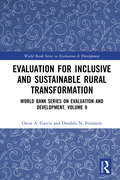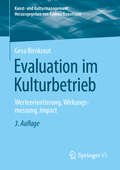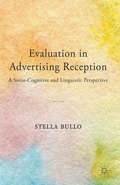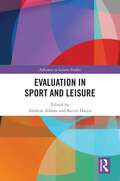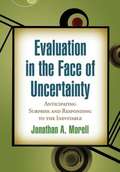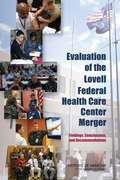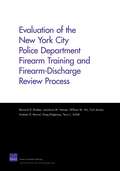- Table View
- List View
Evaluating Family-Based Services
by Mark W. Fraser Peter J. Pecora William Meezan Kristine E. Nelson Jacquelyn McCroskeyFirst Published in 2018. Routledge is an imprint of Taylor & Francis, an Informa company.
Evaluating IT Projects (Routledge Focus on Business and Management)
by Eriona ShtëmbariProject management disciplines have been a part of IT for many years. Why then, are so many challenges still directly associated with how a project is managed? Many projects fail for a myriad of reasons; most, however, stem from poor or inadequate project evaluation and performance appraisal, while, improved project planning and direction is considered to be one of the key factors to IT project success. Eriona Shtembari arranges evaluation methods and techniques into three groups, managerial-financial-and-development. This book explores the process of project evaluation and the purposes of evaluation, given its strong relationship to the success of the project. It examines IT project evaluation; identifies methods and techniques to be used throughout the project life cycle; examines the benefits of project evaluation and proposes a systematic approach/framework of project evaluation to serve as a tool for successful project management. <P><P>Shtembari analyses the most up-to-date research relating to the process and methods/techniques of project evaluation, throughout the project life cycle. From the systematic literature review, she identifies the most usable methods and techniques in project evaluation and focuses on the adequacy of these methods and techniques in the service sector. The theoretical underpinning of the book, serves as a base to interpret the interviews in the case study and build a theory as to how the project evaluation context relates to the proposed scientific theory. The findings in this book provide solutions for practitioners to help them boost the evaluation framework and consequently improve their IT project management.
Evaluating Identities Online: Case Studies from the Spanish Speaking World
by Pilar Garcés-Conejos Blitvich Patricia Bou-FranchThis book examines how identities are constructed in digital, multimodal discourse, and how these identities (gender, age, race, ethnicity, professional, etc.) are generally evaluated as they are claimed, attributed, verified, and non-verified intersubjectively in a polymedia space. Although the construction of online identity has been addressed in the literature, the online construction of identity in the Spanish speaking world has received less focused attention. This volume contains chapters by renowned specialists in pragmatics and digital communication, and is the most recent output of an ongoing externally funded project (UPO-1380703). The book includes a state-of-the-art introduction by the editors followed by three main sections: the first is devoted to examining digital identifies in conflict; the second addresses self-presentation on Twitter and Instagram, with a special focus on politics and gender; and finally, the third addresses identity construction in the genre of online reviews. All of the chapters address self and other identity construction in contexts of both convergence and controversy, in a variety of digital social platforms and practices related to gender, age, political stance, race, ethnicity, and lifestyle. Further, many of these chapters approach identity construction from a contrastive perspective, and thus address variation. This book will be of interest to scholars, researchers, graduate, and advanced undergraduate students in sociolinguistics, (contrastive) pragmatics, discourse analysis, media studies, linguistic anthropology, and communication studies, among others.
Evaluating Public Programmes: Contexts And Issues (Routledge Revivals)
by Ian ShawThis title was first published in 2000: A detailed study of a number of key issues arising in evaluation research, in particular the impact of context upon evaluation findings and the implication context has for methodology. Providing case study illustrations, the work includes discussion of definitions and uses, experimental logic, methods and difficulties in experimental evaluations and the importance of incorporating both process and context in evaluation research design.
Evaluating Reforms of Local Public and Social Services in Europe
by Hellmut Wollmann Ivan Koprić Gérard MarcouThis book explains the increasing demand for evaluation as a result of the increasing frequency of reforms to local services, influenced by the New Public Management doctrine, the severe austerity policy in many European countries, and the wish to increase quality and reduce costs of public services, especially at the local (sub-national) level. Positioned at the interface of local services and evaluation research, it will enable the utilization of evaluation-generated knowledge in evidence-based policy making by focusing on the lessons learned from evaluation of local service delivery. It encompasses local public and social services (including waste, water, public transport, healthcare, education and eldercare) and examines the hypothesis that there is a North-West-South-East divide in Europe in terms of the evaluation of local service reforms. Particular attention is devoted to the explanatory function of evaluation. Providing fresh insight into the functioning of local government machinery in contemporary Europe, this book will appeal in particular to practitioners and students of local government, public economy, public administration and policy.
Evaluating Teacher Quality in Higher Education
by Robert Aylett Kenneth GregoryDrawing on material presented at a one day conference, this collection addresses the need to recognize academics' contributions to higher education, as well as the ways in which academics' efforts in the teaching and learning process can be acknowledged and suitably rewarded.
Evaluating Treatment Environments: The Quality of Psychiatric and Substance Abuse Programs
by Rudolf H. MoosEvaluating Treatment Environments describes how to assess the quality of psychiatric and substance abuse programs and how to use that information to monitor and improve these programs. Its aim is to identify environments that promote opportunities for personal growth, simultaneously enhancing both physical and psychological well-being. Although treatment programs are diverse, Moos asserts that a common conceptual framework can be used to evaluate them, and more emphasis should be placed on the process of matching personal and program factors and on the connections between such matches and patients' outcomes.The book is divided into three main parts. Part I focuses on hospital programs, using a sample of 160 programs throughout the United States. Part II evaluates community programs. Moos describes how to monitor and improve these programs, and assesses program implementation. Part III considers treatment environments, examining factors that shape the treatment environment, patients' satisfaction with and participation in program activities, patients' adaptation and community living skills, and patient-program congruence and the influence of treatment environments on patients with different levels of impairment. It also highlights the importance of the health care workplace and its impact on staff and the treatment environment.Treatment programs vary substantially in their policies and services, especially in what they expect of clients, rules about clients' daily life choices, and to what extent clients must be governed by the program, and whether or not the programs provide health and treatment services. Comparison studies are becoming more important as clients move more quickly from acute in-patient to community residential care. Moos stresses the need to pay special attention to how programs and services affect clients when conducting evaluations. Evaluating Treatment Environments will be a necessary addition to the libraries of mental health service professionals, as well as sociologists, psychiatrists, psychologists, and social workers.
Evaluating Welfare Reform in an Era of Transition
by Institute of MedicineReform of welfare is one of the nation's most contentious issues, with debate often driven more by politics than by facts and careful analysis. Evaluating Welfare Reform in an Era of Transition identifies the key policy questions for measuring whether our changing social welfare programs are working, reviews the available studies and research, and recommends the most effective ways to answer those questions.This book discusses the development of welfare policy, including the landmark 1996 federal law that devolved most of the responsibility for welfare policies and their implementation to the states. A thorough analysis of the available research leads to the identification of gaps in what is currently known about the effects of welfare reform.Evaluating Welfare Reform in an Era of Transition specifies what-and why-we need to know about the response of individual states to the federal overhaul of welfare and the effects of the many changes in the nation's welfare laws, policies, and practices.With a clear approach to a variety of issues, Evaluating Welfare Reform in an Era of Transition will be important to policy makers, welfare administrators, researchers, journalists, and advocates on all sides of the issue.
Evaluating and Promoting Positive School Attitude in Adolescents
by Mandy SternAt a time when rates of depression and other mental health problems are increasing significantly among high school students, measures of school attitude and well-being are of central importance to school practitioners. Students with positive attitudes about school experience more beneficial outcomes and are also less likely to engage in maladaptive, risky behaviors. Therefore, monitoring how students feel about their experiences at school is important, and a novel, fresh approach to examining school attitude is sorely needed. Past studies of school attitude have generally focused on internal, psychological correlates of school attitude, such as individual and subjective reports of students' attitude toward school and their motivation levels. Evaluating and Promoting Positive School Attitude in Adolescents goes beyond these traditional measurements and explores less psychologically focused indicators, including ecological factors and observable behaviors. This study provides school psychologists with a new, comprehensive, and ecologically based approach with which to evaluate the school attitude of high school students.
Evaluating and Valuing in Social Research
by Thomas A. Schwandt Emily F. GatesMuch applied research takes place as if complex social problems--and evaluations of interventions to address them--can be dealt with in a purely technical way. In contrast, this groundbreaking book offers an alternative approach that incorporates sustained, systematic reflection about researchers' values, what values research promotes, how decisions about what to value are made and by whom, and how judging the value of social interventions takes place. The authors offer practical and conceptual guidance to help researchers engage meaningfully with value conflicts and refine their capacity to engage in deliberative argumentation. Pedagogical features include a detailed evaluation case, "Bridge to Practice" exercises and annotated resources in most chapters, and an end-of-book glossary.
Evaluation Essentials
by Marvin AlkinWritten in a refreshing conversational style, this text thoroughly prepares students, program administrators, and new evaluators to conduct evaluations or to use them in their work. The book's question-driven focus and clear discussions about the importance of fostering evaluation use by building collaborative relationships with stakeholders set it apart from other available texts. In 26 concise sections, Marvin C. Alkin explores how to articulate answerable evaluation questions, collect and analyze data using both quantitative and qualitative methods, and deal with contingencies that might alter the traditional sequence of an evaluation. Student-friendly features include handy bulleted recaps of each section, "Thinking Ahead" and "Next Steps" pointers, cautionary notes, annotated suggestions for further reading, and an in-depth case study that provides the basis for end-of-chapter exercises.
Evaluation Essentials, Second Edition: From A to Z
by Marvin C. Alkin Anne T. VoThoroughly revised and updated, this engaging text has given thousands of students and new evaluators the practical information and expert advice needed to conduct or use evaluations. In 26 concise sections, the book describes how to articulate answerable evaluation questions, collect and analyze data using both quantitative and qualitative methods, and deal with contingencies that might alter the traditional sequence of an evaluation. Special strengths of the text are its attention to individual, organizational, and community culture and emphasis on building collaborative relationships with stakeholders. An in-depth case study and related end-of-section exercises (including group activities) help students put themselves in the evaluator role. Other pedagogical features include section titles written as questions, bulleted recaps of each section, "Thinking Ahead" and "Next Steps" pointers, cautionary notes, and suggestions for further reading. New to This Edition *New and expanded topics: evaluation contracts, budgeting, surveys, data visualization, qualitative coding and memoing, factors affecting evaluation use, and context-sensitive evaluation. *Revised case study with extended exercises that guide the reader to complete a simulated evaluation. *End-of-section "Quick Read" links to recommended American Evaluation Association blog posts. *Four entirely new sections (such as "How Do You Strengthen Relationships with Stakeholders?" and "How Do We Plan a Process-Focused Evaluation Design?"), plus other changes and additions throughout.
Evaluation Essentials: From A to Z
by Christina A. Christie Marvin C. Alkin Anne T. VoBeloved for its conversational style and reliable advice, this text is now in a revised and updated third edition, reflecting key developments in evaluation. It includes expanded coverage of equity and social justice issues, values and cost analysis, visualizing qualitative data with software, and more. Twenty-six concise chapters, or "sessions," give students, applied researchers, and program administrators a solid foundation for conducting or using evaluations. Covering both quantitative and qualitative methods, the book emphasizes fostering evaluation use. It shows how to build collaborative relationships with users; formulate answerable evaluation questions; deal with contingencies that might alter the traditional sequence of an evaluation; and collect, analyze, and report data. Student-friendly features throughout the sessions include titles written as questions, bulleted recaps, "Thinking Ahead" and "Next Steps" pointers, cautionary notes, and annotated suggestions for further reading. An in-depth case study provides the basis for end-of-session practice exercises. New to This Edition *New sessions on context-sensitive evaluation, including the organizational, sociopolitical, and community contexts of a program. *New or expanded discussions of timely topics: identifying evaluation decision makers, analyzing program costs, coding and visualizing qualitative data with software, and more. *Updated suggestions for further reading and discussion in every chapter.
Evaluation In Organizations: A Systematic Approach To Enhancing Learning, Performance, And Change
by Darlene Russ-Eft Hallie Preskill Joshua B. JordanTake control of your resources and get the most out of your work with this helpful guide to organization and productivity From new product launches to large-scale training initiatives, organizations need the tools to measure the effectiveness of their programs, processes, and systems. In the third edition of Evaluation in Organizations, learning theory and evaluation experts Darlene Russ-Eft, Hallie Preskill, and Joshua B. Jordan integrate the most current research with practical application to provide the definitive resource on organizational evaluation for managers, human resource professionals, students, and teachers. From designing surveys and interviews to analyzing data to communicating results, the authors present a systematic and rigorous approach to conducting evaluations and using them to foster learning and enhance performance at all levels. Fully revised and updated to reflect new developments in the field, this comprehensive new edition of Evaluation in Organizations is designed to be accessible to as many different learning styles as possible.
Evaluation Platform of Sustainability for Global Systems: Statistical Approach to Geospatial Information for Big Data Integration
by Aki-Hiro Sato Hiroe TsubakiThe authors of this book assert that Grid Square statistics, a method of aggregating data within a geographically defined Grid, may be an effective solution to approach geospatial data for big data integration. Grid Square statistics is a technique that allows us to collect and analyze data based on Grids and makes it easier to understand patterns and trends. Sustainability, a key concern for the future of our society, often involves balancing multiple independent objectives. These objectives and key performance indicators must be shared to solve multi-dimensional optimization problems with some constraints related to sustainability issues. However, many of these sustainability issues are challenges that are part of global systems, which are modeled as a complex system consisting of many components. Social, economic, and environmental aspects in our socio-economic systems require solutions designed for the sustainability of our society. These conditions imply that Big Data must contribute to evaluating our current situation, actions, and changes to continuously change our behavior and society based on a Plan-Do-Check-Action (PDCA) cycle. The PDCA cycle, also known as the Deming cycle, is a four-step management method used to improve processes and products continuously. We must understand how to construct a platform by using Big Data to do so. Thus, extracting meaningful information from Big Data is crucially important in the advanced information society. This book provides case studies based on Grid Square statistics. It shows their applications to socio-economic and environmental problems such as tourism, where we analyze visitor patterns to optimize resource allocation, SDGs indicator, where we monitor the sustainability of our socio-economic systems, and disaster management, where we face natural disaster to enhance preparedness. Finally, the book proposes a World Grid Square Statistics Reference Architecture for constructing data applications across organizations and domains and reports on design concepts, system architecture, and the implication of a data platform for World Grid Square data and statistics.
Evaluation Roots: Theory Influencing Practice
by Christina A. Christie Marvin C. AlkinShowing how evaluation practice looks when guided by theory, the third edition of the influential "theory tree" book is significantly revised with over 80% new material, including a greater focus on equity and theories over theorists. Chapters from leading authorities describe the goals of each theory; the type of evaluation for which it is appropriate (formative, summary formative, summative, adaptive); the size of the program for which it is most applicable; specific prescriptions; and observable actions that help to define the theory. Readers are given the tools to select suitable approaches for the size, contexts and stage of an evaluation and their own personal values. New to This Edition *Chapters on culturally responsive evaluation, Indigenous evaluation, and developmental evaluation. *Organized around theories rather than individual theorists. *Increased attention to practical applications, including a chapter distilling the goals, methods, and standards of evaluations based on each theory. *Case study chapter on the role of theory in evaluation policy.
Evaluation and Social Justice in Complex Sociopolitical Contexts: New Directions for Evaluation, Number 146 (J-B PE Single Issue (Program) Evaluation)
by Barbara Rosenstein Helena Desivilya SynaThis volume is devoted to the theme of social responsibility, social justice, and evaluation. It examines the evaluation–social justice interface and: shares a variety of options and examples from different settings, gives voice to populations whose voices are rarely heard, and contributes to fulfilling the potential of the significant role evaluation can have in promoting social change. First discussing issues related to evaluation, social responsibility, social justice, and marginalized populations in general, it goes on to address issues concerning populations marginalized due to health, psychological, and physical difficulties; their cultural or ethnic/national status; or the specific geopolitical context of Israel. This is the 146th issue in the New Directions for Evaluation series from Jossey-Bass. It is an official publication of the American Evaluation Association.
Evaluation at Work: A Psychoanalytical Critique
by Bénédicte VidailletEvaluation at work has attracted much criticism and its damaging effects are well known, so why does it continue to gain ground in every field? Evaluation at Work: A Psychoanalytical Critique offers an original answer to this question: evaluation spreads because we want to be evaluated. Developing a critical reflection from a psychoanalytic perspective, it argues that workers are not mere victims of evaluation systems but are complicit in them. In this fascinating volume, Bénédicte Vidaillet focuses on the aspects of our subjectivity that come into play in evaluation at work —our expectations, desires, need for recognition, our conceptions of ourselves at work, as well as our relationship with others such as colleagues, managers or clients — to explore how evaluation affects us, where it gets its evocative power, and what it stirs within us to make us want it, despite its detrimental effects in its currently practiced form. Chapters draw on real-life examples, case studies from a variety of organizations, and observations from clinical practice, to provide insight into the many mechanisms that have enabled evaluation to spread unimpeded through our subjective complicity in the process, revealing how they came to seem so innocuous. This book will be of interest to scholars studying the topic of evaluation at work from a critical perspective as well as professionals who use evaluation systems or are under the pressure of evaluation in all sectors and organizations. By exposing the psychological mechanisms that evaluation uses to appeal to us, it gives each of us the tools we need to break free of its grasp.
Evaluation for Inclusive and Sustainable Rural Transformation: World Bank Series on Evaluation and Development, Volume 9 (World Bank Series on Evaluation & Development)
by Oscar A. García Osvaldo N. FeinsteinWritten by a team of expert practitioners at the Independent Office of Evaluation of IFAD, this book gives an overview of evaluation practice at IFAD. It looks at how evaluation practice has evolved to reflect, respond to and inform changing expectations of development assistance. It reveals how evaluation products and methodologies have benefited from key reviews, revisions and lessons learned, and also how they have progressively strengthened IFAD’s capacity to assess its operations and better understand its results. The book concludes with reflections on some of the challenges that lie ahead, including how the independent evaluation function can continue to evolve to meet future challenges and enhance the impact of development initiatives on people’s lives. This valuable insight into practice will be of interest to researchers, practitioners and policymakers in development economics, development studies and rural studies.
Evaluation im Kulturbetrieb: Werteorientierung, Wirkungsmessung, Impact (Kunst- und Kulturmanagement)
by Gesa BirnkrautEvaluation – und in jüngster Zeit vor allem Wirkung bzw. Impact – sind wichtige Instrumente für Kulturinstitutionen. Jedoch wird dies noch immer in vielen Fällen missverstanden, falsch genutzt oder eingesetzt, vielleicht sogar gefürchtet. Das vorliegende Buch will Kulturschaffenden und Institutionen diese Bedenken nehmen und durch Beispiele aufzeigen, welches Potential in Wirkungsmessungen liegen kann. Der Schwerpunkt liegt darauf, Evaluation als langfristigen Lerneffekt für alle Beteiligten zu betrachten. Aufbauend auf einer Definitionsdiskussion werden in dem Buch die Bereiche und Faktoren erarbeitet, die zu einer erfolgreichen Wirkungsmessung führen können. Dabei finden in der 3. Auflage auch Themen Beachtung, die im Zuge der Nachhaltigkeitsdiskussionen im Rahmen einer Gemeinwohlökonomie (wie circular economy und werteorientiertes Handeln) in der Kultur angekommen sind.
Evaluation in Advertising Reception
by Stella BulloPlaced within the context of reception studies, this book investigates how advertisements that rely on re-contextualising shared cultural knowledge are understood by their viewers, and examines their persuasive potential.
Evaluation in Sport and Leisure (Advances in Leisure Studies)
by Andrew AdamsThis book presents a critical assessment of evaluation theory and practice in sport and leisure. It considers established and emerging forms of evaluation; examines typologies, issues, contexts and processes, and asks how evaluation practice can be improved in the future. The book seeks to uncover some of the tensions and dilemmas that are present in choosing and applying evaluation strategies. It considers the relationship between evaluation, context and evaluator to discern how and why a particular strategy is employed. It also highlights how power relationships affect and effect the evaluation process itself as well as those involved in conducting evaluations. The book encourages the reader to challenge accepted methodologies in evaluation, whilst acknowledging the central importance of evaluation and evidence for our understanding of the social impact and value of sport and leisure. This book is important reading for any student, researcher, practitioner or policy maker with an interest in sport, leisure and society, sport and leisure management, policy or development, leisure studies, or the wider relationship between sport, leisure, wellbeing and society.
Evaluation in the Face of Uncertainty
by Jonathan MorellUnexpected events during an evaluation all too often send evaluators into crisis mode. This insightful book provides a systematic framework for diagnosing, anticipating, accommodating, and reining in costs of evaluation surprises. The result is evaluation that is better from a methodological point of view, and more responsive to stakeholders. Jonathan A. Morell identifies the types of surprises that arise at different stages of a program's life cycle and that may affect different aspects of the evaluation, from stakeholder relationships to data quality, methodology, funding, deadlines, information use, and program outcomes. His analysis draws on 18 concise cases from well-known researchers in a variety of evaluation settings. Morell offers guidelines for responding effectively to surprises and for determining the risks and benefits of potential solutions.
Evaluation of the Lovell Federal Health Care Center Merger: Findings, Conclusions, and Recommendations
by Committee on Evaluation of the Lovell Federal Health Care Center MergerThe 2010 opening of the Captain James A. Lovell Federal Health Care Center (FHCC) created a joint entity between the Department of Defense (DoD) and the Department of Veterans Affairs (VA) that replaced two separate centers in North Chicago. VA and DoD leaders envisioned a state-of-the-art facility that would deliver health care to both DoD and VA beneficiaries from northern Illinois to southern Wisconsin, providing service members and veterans seamless access to an expanded array of medical services. Unprecedented for the military and the VA, the Lovell FHCC would integrate clinical and administrative services under a single line of authority. The DoD asked the IOM to evaluate whether the Lovell FHCC has improved health care access, quality, and cost for the DoD and the VA, compared with operating separate facilities, and to examine whether patients and health care providers are satisfied with joint VA/DoD delivery of health care. Evaluation of the Lovell Federal Health Care Center Merger: Findings, conclusions, and Recommendations finds that initial implementation of the Lovell FHCC has provided important lessons about how to integrate VA and DoD health care services and has identified remaining obstacles that the departments could overcome to make such mergers more effective and less costly to implement. The IOM recommends that the VA and the DoD develop a comprehensive evaluation plan to objectively judge its success or failure, with measurable criteria, that would provide essential knowledge for both the Lovell FHCC and future endeavors.
Evaluation of the New York City Police Department Firearm Training and Firearm-Discharge Review Process
by Bernard D. Rostker Andrew R. Morral Carl Jensen William M. Hix Lawrence M. HanserIn January 2007, New York City Police Commissioner Raymond W. Kelly asked the RAND Corporation to examine the quality and completeness of the New York City Police Department's firearm-training program and identify potential improvements in it and in the police department's firearm-discharge review process. This monograph reports the observations, findings, and recommendations of that study.
